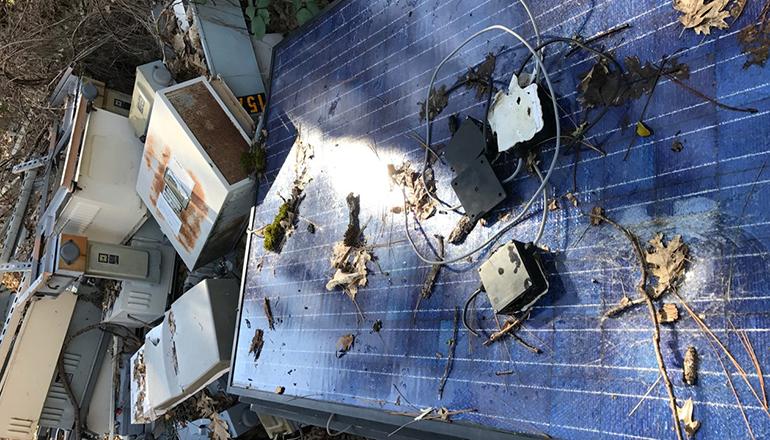Recycling Solar Panels – The Next e-Waste Wave?
South Africa gets about 2500 hours of sunshine every year, making it one of the sunniest countries in the world. That means we have more than enough daylight to go around for generating solar power. Plus, the government recently announced tax rebates for solar panels and is working on a pricing plan for selling power back to the grid.
This all sounds like good news for the environment, but solar panels come with a catch. They contain hazardous chemicals, which means you can’t throw them away with your regular rubbish. Responsible disposal is a must to make solar a truly eco-friendly energy source.
What are Solar Panels Made Of?
There are two types of solar panels: silicone-based and thin-film. About 90 – 95% of the panels we use are silicone based – those are the familiar black panels you see on many rooftops. These panels are made up of silicon solar cells (PV cells) laid in a grid and connected by strips of metal. The cells are covered by glass and packed together in an aluminium frame. There is also copper wiring inside and at the back of each panel.
PV cells contain the following metals:
- Silver
- Copper
- Tin
- Lead
- Cadmium
Most of these metals can damage the environment if they’re not disposed of correctly, which is why solar panels should not end up in landfills.
Are Solar Panels Recyclable?
The good news is that solar panels are recyclable! Recyclers can take them apart to recycle the copper wiring, glass cover, and aluminium frame, which make up about 80% of a solar panel’s weight. However, recycling the PV cells themselves can be tricky. Most recyclers simply shred them up – destroying the silicone, silver, tin, and other valuable materials inside.
Separating PV cells carefully with heat and chemicals could help us retrieve the silicon without damaging it. Solar silicon is an expensive material that recyclers can sell for a higher price. While the technology needed to recycle PV cells can be expensive, investing in it means keeping valuable metals in the economy and out of the environment.
Giving Old Solar Panels New Life
Solar panels last 25 – 30 years, so if you installed yours in 2000, it may be almost time to replace them. However, just because they’re old doesn’t mean they don’t work. Solar panels simply become less efficient over time, so you can often keep using them long after the 25-year mark. You can donate or sell used solar panels to rural communities or schools that do not have access to electricity.
Leasing your used panels is another way to keep them out of landfills. That means installing them on a homeowner’s roof in exchange for monthly payments. Some companies overseas also refurbish old panels for resale, which is an opportunity we can explore in South Africa.
A Brighter Future for the Solar Industry
The solar industry is relatively new and still has lots of room for innovation. Many private companies have launched exciting projects to make solar power more sustainable through recycling. For example, researchers in France, Australia, Korea, and the USA are working on better ways of recycling PV cells that save more materials from landfills.
A Filipino engineering student from Mapua University recently made sustainable waves when he invented a new material for harnessing solar energy. Carvey Ehren Maigue constructed his AuREUS solar panel using luminescent particles found in fruits and vegetables, which he collected from food waste.
These particles absorb the sun’s UV rays, turning them into light that we can convert into electricity. His prototype generated enough power to charge two cell phones every day – even when it was cloudy. The ambitious student dreams of covering entire buildings with these colourful panels to turn them into vertical solar farms. His invention won the James Dyson Award for sustainability in 2020.
Innovations like these could help us generate clean electricity without hazardous waste. Plus, Maigue’s invention puts developing countries on the map – inspiring young people around the world to share their ideas for a more sustainable future.
Start Planning for a Solar Panel’s End-of-Life Early
Did you know that end-of-life solar panels are considered e-waste, which was banned from SA landfills in 2021? Under the new EPR laws, manufacturers and importers will have to offer clean disposal methods for their customers. It’s time to develop simple systems for donating, refurbishing, reselling, and recycling old panels to prevent pollution in the future.
eWASA helps businesses in the electrical and electronics industries meet their EPR requirements with take-back and recycling schemes, reporting, and more. Contact us to find out how we can help you plan for your product’s future today.
SOURCES
- https://www.epa.gov/hw/end-life-solar-panels-regulations-and-management
- https://www.euronews.com/green/2022/02/19/solar-panels-built-from-waste-crops-can-make-energy-without-direct-light
- https://www.theverge.com/2021/12/29/22857157/solar-recycling-new-better-method
- https://infrastructurenews.co.za/2023/01/05/managing-your-solar-panel-waste/
- https://hbr.org/2021/06/the-dark-side-of-solar-power
- https://www.euronews.com/green/2023/03/06/recycling-dead-solar-panels-isnt-easy-these-australian-scientists-might-have-found-a-solut
- https://www.altenergymag.com/article/2022/01/innovations-in-end-of-life-solar-panel-disposal-recycling/36679
- https://circular-energy.org/2023/02/01/s-south-africas-solar-power-boom-should-include-plans-for-environmentally-sound-waste-management/
- https://www.forbes.com/sites/michaelshellenberger/2018/05/23/if-solar-panels-are-so-clean-why-do-they-produce-so-much-toxic-waste/?sh=7e5547cc121c

